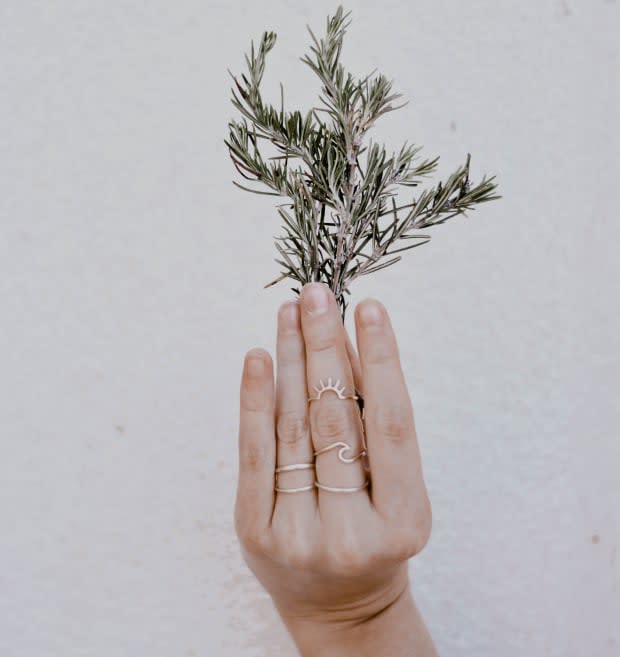TikTokers Swear This Popular Oil Can Prevent Hair Loss—Are They Right?
We let actual dermatologists explain.
Hair loss is seriously stressful—and it can be expensive to treat, so it's not surprising that a lot of people are desperate for a home remedy that works and won't break the bank.
Some TikTokers swear by rosemary oil to prevent hair loss and promote hair growth—but does it actually work? And can it ever cause harm?
Here's what actual experts—not influencers or TikTokers—had to say about using rosemary oil for hair loss.
Related: Lawsuit Alleges Popular Haircare Product Causes Hair Loss
Does Rosemary Oil Prevent Hair Loss?
The jury is still out on this one, but experts definitely understand why people want it to work.
"Androgenetic alopecia is extremely common. Our standard treatment options are limited and can have side effects," dermatologist Dr. Mohammad-Ali Yazdani Abyaneh, MD, has explained to Parade. "The desire for better and safer therapies is understandable, but we should be mindful of the quality of evidence available for any novel therapies."
Dr. Yazdani Abyaneh points out, "Most of the online videos surrounding this trend reference a 2015 study by Panahi, et al., in which rosemary oil was compared with topical 2% minoxidil solution over six months for treating hair loss. While the study showed similar improvement between the two groups—suggesting rosemary oil may have some benefit in treating hair loss—there are a lot of important considerations before recommending this as a treatment to patients."
Related: Ashley Tisdale Opens Up About Managing Alopecia
These considerations, according to Dr. Yazdani Abyaneh, include:
Type of hair loss: The study only looked at patients with androgenetic alopecia (or male pattern hair loss).
Patients in the study: The patients in the study were all men, which means the results are not generalizable to women.
The minoxidil formulation in the study: The study compared rosemary oil to 2% minoxidil solution in men, even though the 5% formulation is more effective and would have been a more appropriate comparison.
The version of minoxidil in the study: The study showed that rosemary oil causes less itching than minoxidil solution. It's important to bear in mind the foam version of minoxidil is known to be less irritating than the solution.
The specific rosemary oil used in the study: The preparation and specific ingredients of topical rosemary oil products marketed in the United States likely vary from the specific product used in this study. The preparation and content of these products are not standardized.
"Overall, this was a small study, patients were not blinded to the treatment they received, which can also affect outcomes," Dr. Yazdani Abyaneh adds. "The findings have not yet been reproduced by other investigators in large studies."
Related: 26 Best Hair Growth Products You Need To Add To Your Beauty Routine

Related: 13 Reasons Your Hair May Be Falling Out
Can Rosemary Oil Stimulate Hair Growth?
Dermatologist Dr. Aanand Geria, MD, says rosemary oil may help stimulate hair growth, although the evidence so far is largely anecdotal.
"Mediterranean cultures have used rosemary in hair rinses for centuries to promote hair growth and with good reason. Similar to preventing hair loss, rosemary oil's antimicrobial and anti-inflammatory properties have the potential to stimulate hair growth through the promotion of blood circulation and antioxidants," Dr. Geria explains.
That said, there are caveats to using rosemary oil for hair growth and hair loss prevention. According to Dr. Geria, if you want to use rosemary oil, here are the best practices:
Don't rely on just rosemary oil for hair growth. For best results, use rosemary oil in conjunction with other hair growth products.
Don't rinse the rosemary oil out. Dr. Geria recommends applying rosemary oil to the hair and scalp as a leave-in product to give the product a greater chance of exerting effects.
Massage your scalp. When applying rosemary oil, be sure to give your scalp the massage it deserves. Not only does it feel good, but the massaging action may stretch your hair follicle cells to further stimulate growth.
Related: Alopecia Drug Shows Major Regrowth in Clinical Trials
What Are the Risks of Using Rosemary Oil To Prevent or Treat Hair Loss?
Aside from the efficacy of rosemary oil for hair loss being largely undetermined at this time, it's important to remember that just because something is "natural" doesn't mean it's healthy or safe for everyone. DIY remedies using rosemary oil for hair growth can pose serious risks.
"While rosemary oil is natural, as with all plant extracts and botanicals, it is crucial to be cautious when using it," Dr. Geria advises. "Natural and raw materials can cause irritation and potential allergic reactions."
Dr. Yazdani Abyaneh also gives what may be the best argument ever to avoid rosemary oil for hair growth: it can actually make some people lose more hair!
"Attempts to make this product at home may also cause serious side effects," he warns. "Patients can develop skin allergies (contact dermatitis) to various topical products and if severe enough, that could worsen their hair loss."
Next, check out nutritionists' picks for foods that may help your hair grow faster.
